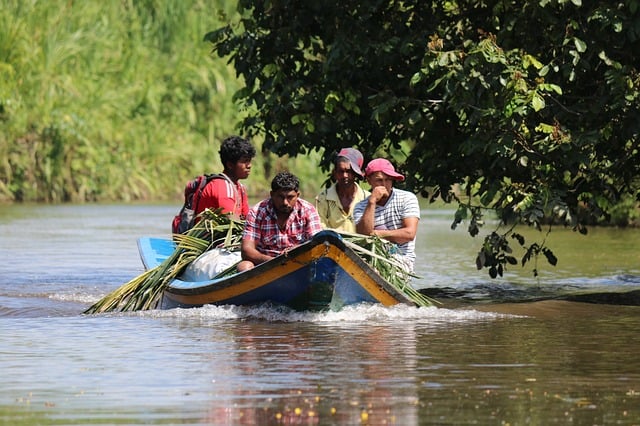The third wave of the pandemic is much worse than the first. Not only are the effects of pollution more virulent, but the tiredeness of the population due to social distancing, and peoples’ power of personal and economic resilience have reached their limits. In my life I have rarely seen hunger and misery so close.
The rate of vaccination is below the rate of contagion. This results in hospital burnout, collapses in intensive care, and surprisingly, possible collapses in funeral services.
Local administrators take measures to reduce contagion and avoid extreme situations, but the economic consequences for the low-income population, without formal employment or micro-enterprises, are devastating. Small companies that employ up to nine people, with a family profile, represent two-thirds of the companies in our region. There is no reasonable or sufficient financial support that can mitigate the risk of financial survival.
But this incredibly negative but possible scenario will last as long as the pandemic remains at its peak, and in our case in Latin America, throughout the year 2021. Several financial institutions foresee a recovery of the economy in the third and fourth quarters of 21, where consumption will react vigorously again. This is good news, and 2022 will be even better, if we know how to protect ourselves with vaccines.
So our problem boils down to six months? And we go into recovery mode?
At first glance, it would appear to be so. But structurally, we will come out much poorer, with a greater concentration of wealth, less globalized and more digitized.
Absolute global poverty will increase brutally after 2021. The hunger rate will be much higher and social structures, the fragile social network, will collapse in many ways.
Economic instability, and especially social instability, will bring with it political radicalization and the possibility of social upheaval. It is not surprising that this year we have some summits of heads of state discussing the issue of food (World Food System Summit 2021, Tokyo Nutrition for Growth), economic recovery and the climate (COP26) 1 /.
In this Latin Trade panel we already raised the issue of resetting the mindset in 2020 2 /, and we had the virtual meeting in Davos, with exactly this approach. Klaus Schwab, a keen observer of trends, in his opening speech at the World Economic Forum, said that we must quickly seek a New Social Contract in the world 3 /. He observes that the concentration of capital and the simultaneous increase in poverty, even before the pandemic already deserved strong attention, but in the post-pandemic world it becomes a critical factor of global development.
The great social contracts that we had in history began with disruptive events. In the pre-industrial era between 1870-1900, then with communism spreading in the world from 1920 to 1950. With the fall of the Berlin Wall, global improvements began, but in a very tenuous way. With the arrival of the Digital Revolution 4.0, the labor system substantially changed the relationship between labor and capital income, but they were not enough to formulate a new social contract. But the pandemic is a shock, globally, of profound impacts, which took the problems of poverty and wealth to the extreme. The more digital world of the pandemic has changed the way we work, live, study, and have fun. The post-pandemic world will not be the same.
At the moment we are just improvising. Although we had all the conditions to modernize and update the employment relationship, income, accelerated education, digital innovation and new management in health, business, small or large, the mental rootedness to the old solutions and standards, will make these transformations very painful and difficult. We think that the old way of solving problems will be enough for new situations.
The most severe impoverishment will be in the developing countries, and the developed countries will have greater comparative advantages to overcome this scourge 4 /. The recent IMF meeting shows this disparity, which is of great concern to central bank presidents 5 /. The U.S. agenda, for now, is to speed up the vaccine in a spectacular way and then resume normal life in the economy and social coexistence. The United States will be the first to do very well this year. The European Union will march slower, due to its bureaucracy and lack of pragmatism in the management of effective solutions. China, Japan and Korea, by inherent discipline and different regimes, will achieve very satisfactory solutions.
India, Africa and Latin America will be the last to come out.
Smaller countries will come out late, not because they can’t afford them, but because they don’t have access to vaccines. This shows how little international solidarity really worked. Each one thought of their domestic solution. From the beginning it was possible to think of global solutions, but there was no leadership with these qualities.
Entrepreneurs know that without a new social contract in which we have a relevant role, we will have big problems.
But who will a New Social Contract come from? Those who did better or worse with the crisis?
Economically, we will have a much higher global debt, which worries economists a lot, due to instability, which will translate into inflation, interest, debt payments, assumption of losses, among others. For those who continue with monetary easing (USA and Europe), their currencies will weaken and that of other countries, such as those of Latin America, will appreciate, reducing their competitive capacity, so they will have to tighten their belts even more.
So the solutions for a New Social Contract should come from the most fragile countries, but will they be heard? Will there be anyone who agrees with those solutions?
I think not, and therefore the confrontations will be much more pronounced, more difficult. As long as we have democratic institutions in place, these confrontations will be tough, but with a great risk of political radicalization for either side. In a recent CEAL webinar, the general opinion was that we had strengthened democratic institutions, but leaders unprepared for the current situation. Therefore, it will be difficult for the political leadership to initiate this process, which places civil society at the forefront of the debate for a New Social Contract.
It is not surprising that in the Latin American region several countries are under the pressure of a constitutional review, which gives them the opportunity to go from a country of privileges to a nation of opportunities. This is the call for a book recently launched in Brazil by one of the most recognized and respected jurists, Modesto Carvalhosa 4 /.
This New Social Contract must contemplate a review of the political, social and economic order, bringing people closer to their subordinates, strengthening decision-making processes in the parties, in public and private administrations, through freedom, insertion, transparency and flexibility. We will have to, however controversial, rethink the minimum wage to satisfy the hunger and misery of our Continent. Increase civil and private participation and limit State action. Redefine the central theme of sovereignty, increase solidarity and regional integration. The new way of working, flexible, digital and face-to-face, to strengthen small companies, initiatives and innovations in all fields. More interconnected currencies and strengthening for the integration of investments, the most agile, fair and easy commercial relationship. Having the digital world in our favor, in social, educational, environmental and legal innovation, providing transparency, agility and access.
This debate should start as soon as possible and the more representative it is, the less attrition will be and the lower long-term social cost.
It should not only be a debate of developing countries, but the participation of developed countries will be of great relevance. We need to involve our supranational institutions, IDB, CAF, OAS, among others. Even because these transformations, the more shared, the less unfair they will be in access to markets and social justice and solidarity. It is an institutional debate of the international organizations and the democratic institutions of the countries, of us businesspeople and of the Latin American citizen, finally of YOU!
We have to start now!



